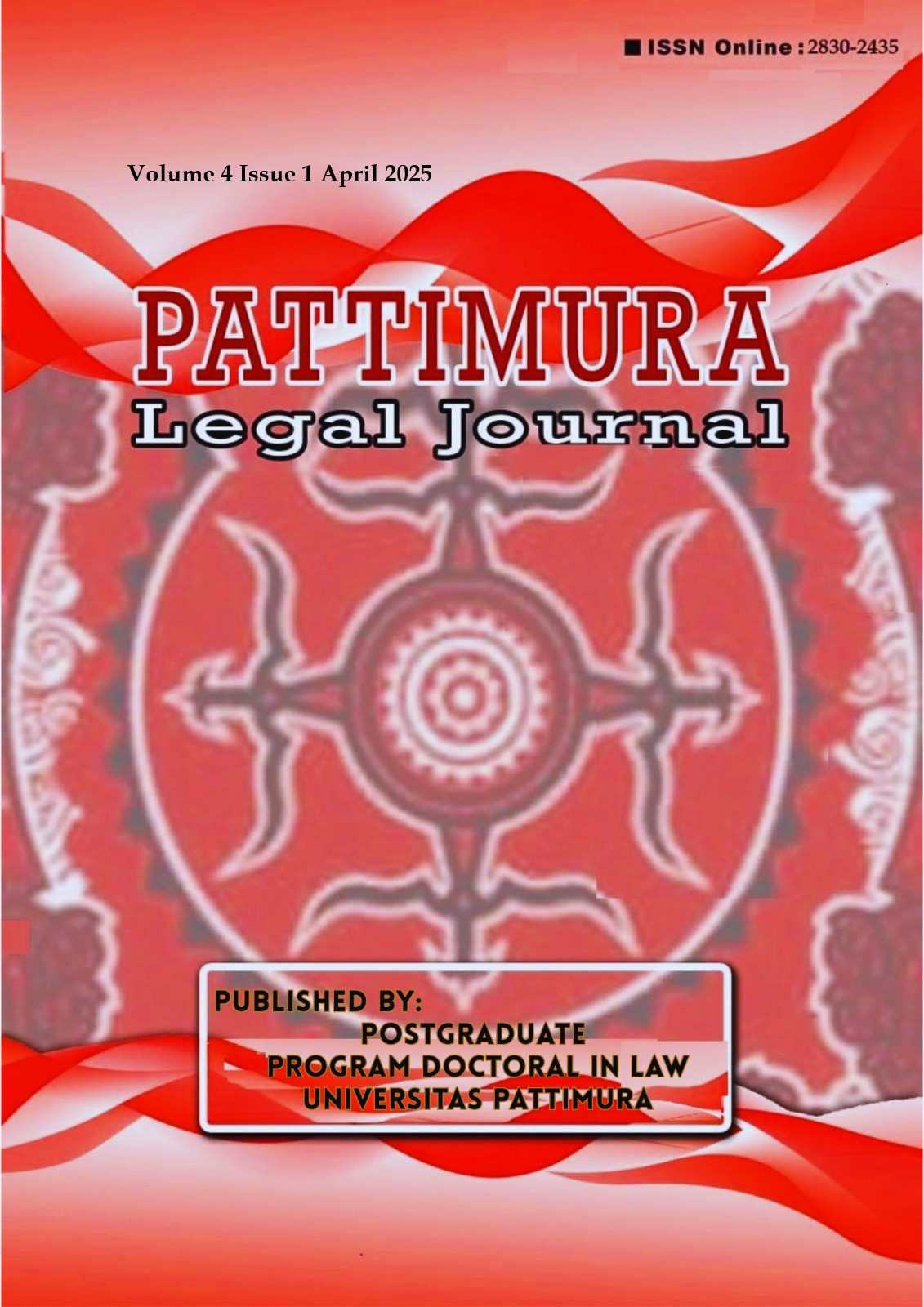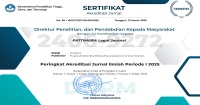The Legal Certainty Versus National Economic Recovery: Peace Fines by Prosecutors in Corruption Crimes Comparative Law Perspective
Abstract
Introduction: The application of peace fines in corruption crimes in Indonesia creates a complex legal dilemma. The Prosecutor's Law grants prosecutors the authority to use peace fines in economic crimes, but on the other hand, the Anti-Corruption Law explicitly states that the return of state losses does not absolve the criminal liability of corruption perpetrators.
Purposes of the Research: This research aims to analyze the aspect of legal certainty related to the application of peace fines in connection with corruption crimes, linked to national economic recovery efforts, and a comparative legal analysis in other countries regarding peace fines in the enforcement of corruption crimes.
Methods of the Research: This research is a normative legal study with a conceptual, legislative, and comparative legal approach.
Results Main Findings of the Research: The research results show that the application of restorative fines related to corruption crimes in connection with national economic recovery efforts does not yet guarantee legal certainty due to a conflict of rules between Article 35 paragraph 1 letter (k) of the Amendment to the Prosecutor's Law and Article 4 of the Anti-Corruption Law. The issue can be resolved with the principle of lex specialis derogat legi generali. The application of peace fines in England, the United States, and Saudi Arabia above shows that peace fines are of a global nature and constitute a general legal policy in their efforts to save a country's national economy from losses due to corruption. The implementation of peace fines in Indonesia to achieve legal certainty needs to consider several factors, such as clear regulatory revisions to avoid legal uncertainty and conflicts of rules in various laws and regulations.
Downloads
References
Adiguna, Leonardo. “The Prosecutor’s Authority to Conduct a Criminal Investigation Based on The Government Administration Law.” Administrative and Environmental Law Review 2, no. 1 (2021): 11–20. https://doi.org/10.25041/aelr.v2i1.2214.
Ahlul Fiqri. “Paradigm for the Application of the Dominus Litis Principle in the Indonesian State Administrative Court.” JUSTICES: Journal of Law 2, no. 4 (December 2023): 202–12. https://doi.org/10.58355/justices.v2i4.16.
Alkostar, Artidjo. Korupsi Politik Di Negara Modern. 2nd ed. Yogyakarta: FH UII Press, 2015.
Anindytha Arsa Prameswari, Gerhard Mangara, Rifdah Rudi. “Deferred Prosecution Agreement: Mekanisme Pertanggungjawaban Tindak Pidana Korporasi Terhadap Perusakan Lingkungan Melalui Paradigma Restorative Justice.” Lex Generalis 2, no. 12 (2021): 1203.
Ariananto Waluyo Adi, Emmanuel, and Theresia Rachelita Devia Irani. “Reflections and Expectations of Democracy in The Implementation of Regional Autonomy: Long - Term Potential for Appointment of Acting Regional Heads.” Pledoi: Jurnal Hukum Dan Keadilan) 2, no. 1 (2023): 50–68. https://doi.org/10.56721/pledoi.v2i1.184.
Arman Tjoneng, Dian Narwastuty. “Judicial Review by the Public Prosecutor After Ratification of Prosecutor ’ s Law in 2021.” Dialogia Iuridica 14, no. 2 (2023): 160–81.
B, Ajoy P. “Effectiveness of Criminal Law in Tackling Cybercrime: A Critical Analysis,” 2022. https://doi.org/10.36348/sijlcj.2022.v05i02.005.
Cakranegara, Muhammad, and Milda Istiqomah. “The Urgency Of Restorative Justice In Imposing Criminal Sanction Under Law Number 1 Of 2023 Concerning The Criminal Code And Law Number 8 Of 1981 Concerning Criminal Procedure Law Viewed From The Judge ’ s Perspective.” Asian Journal of Management Entrepreneurship and Social Science 04, no. 02 (2023): 822–35.
Chulov, Martin. “‘Malam Pemukulan’: Rincian Pembersihan Ritz-Carlton Di Riyadh Muncul,” 2020.
Cornford, Andrew. “The Aims and Functions of Criminal Law.” The Modern Law Review 87, no. 2 (October 3, 2023): 398–429. https://doi.org/10.1111/1468-2230.12846.
Darmawansyah, Adi. “People’s Role as Victims in State Financial Corruption.” Indonesian Journal of Multidisciplinary Science 2, no. 4 (2023): 2284–93. https://doi.org/10.55324/ijoms.v2i4.420.
Fakunmoju, Segun Kamoru, Olawale Banmore, Abiodun Gbadamosi, and Olajide Idowu Okunbanjo. “Effect of Cryptocurrency Trading and Monetary Corrupt Practices on Nigerian Economic Performance.” Binus Business Review 13, no. 1 (2022): 31–40. https://doi.org/10.21512/bbr.v13i1.7305.
Fernando, Zico Junius, Beni Kurnia Illahi, Yagie Sagita Putra, and Ikhbal Gusri. “Deep Anti-Corruption Blueprint Mining, Mineral, and Coal Sector in Indonesia.” Cogent Social Sciences 9, no. 1 (2023): 1–18. https://doi.org/10.1080/23311886.2023.2187737.
Ilham Nur Pratama, Nurul Restu Azyanti. “Application of Restorative Justice in the Settlement Of Corruption Crimes.” Corruptio 2, no. 2 (2022): 139. https://doi.org/10.29240/negrei.v2i2.5854.
Kohn, Lauren. “Integrity & Accountability Commissions of Inquiry: A South African Perspective.” Utrecht Law Review 20, no. 4 (2024): 98–119. https://doi.org/10.36633/ULR.1045.
Kuntadi. “House of Restorative Justice as a Forum of Actualizing the Nation’s Culture in Solving Criminal Cases.” Dinamika Hukum 22, no. 2 (2022): 144–53. https://doi.org/10.20884/1.jdh.2022.22.2.3242.
Mubangizi, John C. “A Human Rights Based Approach to Fighting Corruption in Uganda and South Africa: Shared Perspectives and Comparative Lessons.” Law, Democracy and Development 24 (2020): 225–47. https://doi.org/http://dx.doi.org/10.17159/2077-4907/2020/ldd.v24.10.
Negara, Tunggul Ansari Setia. “Normative Legal Research In Indonesia: Its Origins And Approaches.” ACLJ 4, no. 1 (2023): 5.
Pahlevi, Farida. “Pemberantasan Korupsi Di Indonesia Perspektif Legal System Lawrence M. Freidmen.” El-Dusturie 1, no. 1 (2022). https://doi.org/10.21154/eldusturie.v1i1.4097.
Prasetio, Dicky Eko, Fradhana Putra Disantara, Nadia Husna Azzahra, and Dita Perwitasari. “The Legal Pluralism Strategy of Sendi Traditional Court in the Era of Modernization Law.” Rechtsidee 8 (March 9, 2021): 1–14. https://doi.org/10.21070/jihr.2021.8.702.
Rahardjo, Satjipto. Penegakan Hukum:Suatu Tinjauan Sosiologis. Yogyakarta: Genta Publishing, 2009.
Rivana Tesalonika Troreh, Rumokoy, Donald A, Toar Neman Palilingan. “Praktik Konvensi Ketatanegaraan Terhadap Masa Jabatan Jaksa Agung Di Indonesia.” Lex Privatum 9, no. 4 (2023): 6–9.
Riyadi, Bambang Slamet, Usman, and Elly Sudarti. “The Disparity in Criminal Prosecution against Acid Attack on Investigator of Corruption Eradication Commission: "novel Baswedan” Case.” International Journal of Criminology and Sociology 9, no. 1999 (2020): 1676–87. https://doi.org/10.6000/1929-4409.2020.09.191.
Setya, Deni, Bagus Yuherawan, and Muhammad Huzaini. “Pertentangan Antara Asas Oportunitas Dengan Asas Equality before the Law (Pasal 35 Huruf c Uu Nomor 16 Tahun 2004 Tentang Kejaksaan Republik Indonesia).” Justitia 6, no. 2 (2021): 165.
Suisno, Enik Isnaini, Ahmad Royani. “Termination Of Accurate Investigations And Restorative Justice.” Independen 10, no. 1 (2022): 32–42.
Sulistiani, Lies, Hazar Kusmayanti, Elis Rusmiati, and Efa Laela Fakhriah. “Forgiveness and Peace Agreement as an Implementation of Living Law in Certain Crimes in Indonesia.” International Journal of Health Sciences 6, no. 1 (2022): 4083–4100. https://doi.org/10.53730/ijhs.v6ns7.12715.
Tedjokusumo, Dave David, and Carissa Amanda Siswanto. “Criminal Law Reform In Criminal Responsibility For People In Mental Disorders Oriented To Dignified Justice.” Jurnal Usm Law Review 6, no. 3 (2023): 1040. https://doi.org/10.26623/julr.v6i3.7928.
Terry Hutchinson. Reseaching and Writing in Law. Pyrmont: Thomson Reuters, 2010.
Thompson, Daniel M. “How Partisan Is Local Law Enforcement? Evidence from Sheriff Cooperation with Immigration Authorities.” American Political Science Review 1, no. 2017 (2019): 1–15. https://doi.org/10.1017/S0003055419000613.
Ulfah, Maria. “Pidana Kerja Sosial, Tokyo Rules, Serta Tantangannya Di Masa Mendatang.” Jurnal Magister Hukum Udayana (Udayana Master Law Journal) 10, no. 3 (2021): 517. https://doi.org/10.24843/jmhu.2021.v10.i03.p07.
Usman, Rachmadi. “Exploration of Nexus between Legal Liability and Corporate Fraud: Where Do Business Laws and Criminology Converge?” International Journal of Criminal Justice Sciences 18, no. 1 (2023): 232-243–232–243. https://doi.org/10.5281/zenodo.4756212.
Walim. “The Concept of Restorative Justice in the Criminal Legal System: A Breakthrough in Legal Benefits.” IJLR: International Journal of Law Recontruction 8, no. 1 (2024): 1–12.
Werdhiyani, I Gusti Ayu, and I Ketut Rai Setiabudhi. “Policy Formulation Against Bribery in the Private Sector in Indonesian Criminal Law Reform.” Sibatik Journal: Jurnal Ilmiah Bidang Sosial, Ekonomi, Budaya, Teknologi, Dan Pendidikan 2, no. 3 (2023): 781–92.
Wibisono, Keris Aji, and Umar Ma’ruf. “The Law Enforcement Against The Crime Of Illegal Mining.” Law Development Journal 3, no. 2 (2021): 424. https://doi.org/10.30659/ldj.3.2.424-430.
Copyright (c) 2025 Fradhana Putra Disantara, Mac Thi Hoai Thuong (Author)

This work is licensed under a Creative Commons Attribution-NonCommercial 4.0 International License.
Authors who publish their manuscripts in this Journal agree to the following conditions:
- The copyright in each article belongs to the author, as well as the right to patent.
- Authors are able to enter into separate, additional contractual arrangements for the non-exclusive distribution of the journal's published version of the work (e.g., post it to an institutional repository or publish it in a book), with an acknowledgment of its initial publication in this journal.
- Authors are permitted and encouraged to post their work online (e.g., in institutional repositories or on their website) prior to and during the submission process, as it can lead to productive exchanges, as well as earlier and greater citation of published work.
- Authors have the right to self-archiving of the article (Author Self-Archiving Policy)






















